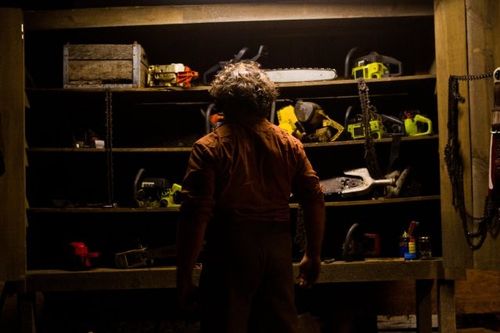Here are some of the takeaways for me after seeing Texas Chainsaw 3D: make sure to read important letters left to you by dead relatives before you move into their mansions; don't jump in open caskets in graves in cemeteries you're not familiar with; women went bare tummy, wore tight jeans held up by wide belts, and traveled in VW mystery machines in the 1990s; stay away from meat packing facilities that have been shut for over 20 years and still have electricity and machinery in perfect running order; don't look through your cell phone camera when walking in strange hallways filled with dead things; and finally, don't pay for 3D when 2D sucks just as much.
Now that I've gotten those takeaways off my chest, I do have a few nagging questions after seeing the movie, too. For one, why doesn't the sheriff shoot? For another, why does Heather stay?
There are a lot of things in Texas Chainsaw 3D that irked me; the gore factor is high and palpable (or pulpable, to be more descriptive) without that freakish energy powering up from the drive-in trashy grit and hillbilly inbred insanity the original sparks with.
Another disappointment is how the promises made during the opening scenes highlighting the original's backstory go unfulfilled. A baby girl is taken after the Sawyer family is killed by local vigilantes fed up with all the Sawyer craziness bringing attention to the small town of Newt, Texas. That girl grows up to be emo Heather (Alexandra Daddario), who creates morbid art from bones, likes slicing meat at the supermarket she works at, and dresses for a different time period than this movie's situated in.
Or maybe I'm confused. Is she twenty-something or near-forty-something? What time period does this movie take place in anyway?
The creatively commercial, but ill-advised, use of a cell phone would place everything in the present, but Heather's sexy bare tummy throughout the movie, and the beat-up Scooby Doo-style VW van (it's like 1974 all over again), and the hitchhiker pickup scene (people still pick up total strangers?) are retro-fits to another decade. Doing the math while basing the total on the original Texas Chainsaw Massacre of 1974 starting point, Heather is either nearing 40 but looks smashingly nubile for her age, or she's really in her early twenties and a Dr. Who type time-warp bubble allows a modern and over-priced cell phone to co-exist with her in the 1990s.
It's a wonder they didn't manage to shoehorn in a plot-use for Michelob, with Heather rolling a cold, wet one across her bare stomach while she's meeting up with the family lawyer (Richard Riehle) in the bar; or at any other time since she never wears a shirt completely buttoned or large enough to cover her mid-section.
Oh, right, about Leatherface...time-warping, sexist clothing, and product positioning aside.
Jed (Dan Yeager), who still wears his polyester clothes from the 1970s, hasn't aged at all. Sequels will do that to you. Like the equally ageless Jason in 2009's Friday the 13th reboot, Jed now has a whole bunch of rooms and hallways to tenderize and skewer his victims in. We see the curious and grisly furnishings while an unwise sheriff holds his gun and cell phone prominently in front of him as he walks through the "catacombs" to his doom.
Spoiler? Are you kidding? How long you been watching horror movies?
Jed's den of iniquity lies beneath the southern mansion Heather has inherited, deep in the heart of Newt, Texas; and behind the metal door (amazing how Heather's grandmother made sure she installed another metal door), waiting with meat mallet at the ready, is Leatherface—and a closet full of chainsaws. The best scene showing context and portent has Jed playing like a cowboy holstering up for his showdown with the bad folk that killed his kin. Now we know what happens when you take Leatherface's chainsaw away: he gets another one.
And he wields it with grisly skill, slicing through torsos, ankles, wrists, chests, and various other body parts not moving out of the way fast enough. An extended face-removal with carefully positioned foot-twitching gave me nightmares. Having Leatherface stitch on a new face (which, curiously, looks like any of his older faces) through his cheeks with a large needle—under what I suspect are very unsterile conditions—in closeup, is not very cheerful, either.
Other critics of Texas Chainsaw 3D appear torn between the semi-humanization of Leatherface as he squares off against the bad guys, and the lack of zest he displays in not lopping off limbs during the carnival festivities as he chases Heather up a Ferris Wheel. One critic even derides the tossing of the chainsaw at the sheriff (and into the 3D audience) as laughable, but Jed's got a whole closet full of them, so why not?
As for humanization and restraint, both are in keeping with the character's motivations. As for me, I'm torn over how Heather, after seeing her friends horribly butchered, still considers Jed family, and the sheriff's decision to let the crazy homicidal son of a bitch keep living, and why Dr. Who never show's up to solve the temporal paradox of director John Luessenhop's screwed up timeline.
If Texas Chainsaw 3D is any indication of what we can expect from Hollywood in their treatment (mistreatment?) of classic horror movie reboots, I want to travel back in time myself before it's too late.
In the meantime, watch John Dies at the End instead.




Comments